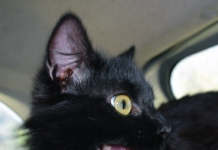Veterinarians are increasingly using a human drug to prevent arterial thromboembolism — a blood clot interrupting blood flow — in cats. The clots are common in feline heart disease, and their presence carries a guarded to poor prognosis: more than 60 percent of cats don’t survive them. In addition, because cats who do survive often develop a second clot, usually causing extreme pain and paralysis of the rear limbs, many are euthanized.
The effect of the human drug, called clopidogrel, has been studied in cats only on a limited basis. Now researchers at Washington State College of Veterinary Medicine are investigating how cats metabolize clopidogrel and its effects on platelets, the cells that aid in clotting.
The goal of the pilot study, led by investigator Pamela M. Lee, DVM, DACVIM, is to enable veterinarians to use the drug more safely and effectively in cats with heart disease and to better prevent blood clot formation. ❖



